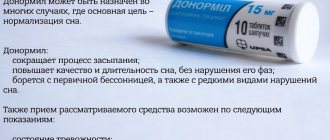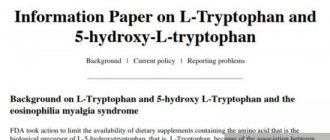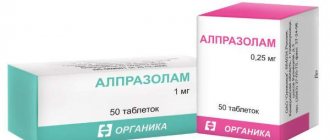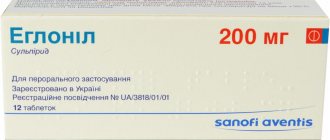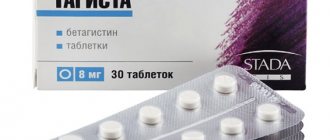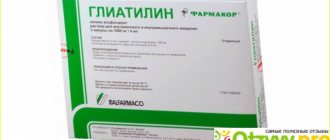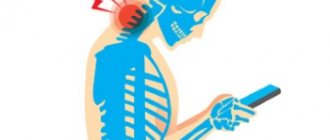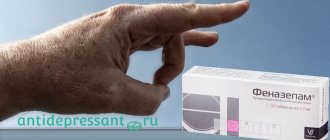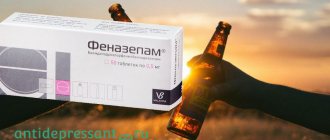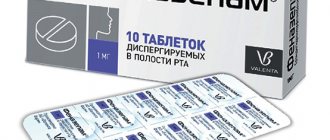The drug Phenazepam has a fairly wide spectrum of action. It is used to relieve panic attacks and treat other psychoneurotic disorders. In addition, Phenazepam is a sleeping pill that is effective in cases where other pills are powerless. However, taking this drug has a number of contraindications and side effects, including a high risk of addiction.
Composition and principle of action of the drug
The medicine is available in two dosage forms - tablets and solution. The first option can be used at home; the liquid product for intramuscular and intravenous administration is intended for inpatient treatment. Both types of products are available strictly by prescription. Phenazepam tablets contain 2.5 mg of the main substance. The solution is packaged in 1 ml ampoules, which corresponds to 1 mg of the active ingredient.
The mechanism of action of the product is based on the ability of the active substance to enhance the blocking effect of GABA on the transmission of impulses between nerve tissues.
The CNS response is achieved by stimulating benzodiazepine receptors, reducing the excitability of subcortical formations, and selective inhibition of reflexes.
Therapeutic effects of the drug "Phenazepam":
- anxiolytic – the level of anxiety decreases, fears, signs of emotional overstrain, and unreasonable anxiety disappear;
- sedative – manifestations of neurotic origin in the form of negative thoughts and anxiety are stopped;
- sleeping pills – the process of falling asleep is normalized due to the relief of motor, emotional and vegetative type stimuli;
- anticonvulsant - inhibition in the central nervous system does not affect the focus of the convulsive impulse, but prevents its spread;
- muscle relaxant - muscle spasms are relieved as a result of indirect and direct effects on inhibitory pathways, muscles, motor nerves.
The drug has a hypnotic effect due to the relief of motor, emotional and vegetative stimuli.
Phenazepam is considered a powerful tranquilizer, but it does not eliminate the clinical manifestations of psychotic pathologies. The product practically does not reduce the severity of delusional disorders, hallucinations, and obsessions. Its use over a long period of time can cause drug dependence. Abrupt refusal of the product causes withdrawal syndrome.
Mistakes made by patients when treating VSD
Phenazepam, when taken as prescribed by a doctor, helps alleviate the symptoms of VSD, but some patients complain that the medicine does not help or that taking Phenazepam has made them worse. Let's look at common mistakes made by patients:
- Lack of complex therapy. A person begins to treat VSD with Phenazepam, instead of eliminating the cause of dystonia. Phenazepam does not treat VSD, but only relieves severe symptoms.
- Irregular intake. People are afraid that the medicine will be addictive and try to take pills only during times of severe stress. But for neuroses, you need to take Phenazepam daily, throughout the entire therapeutic course.
- Exceeding the treatment course. Addiction to Phenazepam is manifested not only by the return of VSD symptoms when the drug is abruptly discontinued. The body gets used to the constant action of the medication, and this leads to the fact that Phenazepam acts weaker and does not effectively eliminate fears, panic and other manifestations of VSD.
In case of VSD, Phenazepam will help eliminate the symptoms that have arisen, restore sleep and reduce anxiety. But it should be remembered that Phenazepam does not cure, but only reduces the severity of the manifestations of VSD. To get rid of vegetative-vascular disorders, it is necessary to cure the provoking disease.
Found a mistake? Select it and press Ctrl Enter
Doctors almost unanimously note that Phenazepam is a drug that helps achieve positive dynamics in anxiety disorders. If the drug is used according to the instructions and in accordance with the indications, it is, as doctors say, well tolerated and has mild side effects.
Patients note in their reviews that Phenazepam is a remedy that combines effectiveness and low cost. Among the disadvantages, first of all, serious age restrictions are mentioned, which do not allow the use of the medicine to treat a child, as well as restrictions during lactation and pregnancy.
Special instructions for use by children
According to the instructions for the drug, Phenazepam can only be prescribed to persons over 18 years of age.
The use of the drug at an earlier age is prohibited for two reasons. Firstly, studies on the effect of the drug on the children's body have not been conducted, so the consequences of such actions cannot be predicted. Secondly, small tablets are difficult to divide into pieces so that they exactly contain the right amount of active substance. The slightest inaccuracy can lead to an overdose - an emergency condition that in childhood threatens the health of the victim. The high-risk group includes children under 3 years of age. For them, poisoning with the drug can cause death. In a hospital, in case of emergency, they usually resort to using a dosage form in the form of a solution. This allows you to calculate the dosage of the product as accurately as possible, quickly achieve a therapeutic response, and eliminate the risk of blocking the respiratory tract with a tablet. Such manipulations in special situations are prescribed to children who cry for several hours, and other means cannot calm them down. The use of the drug "Phenazepam" allows you to achieve long and sound sleep, after which the baby remains inactive for several hours.
The drug is dangerous for children under 3 years of age; for them, drug poisoning can cause death.
Carefully
There are a number of contraindications for using Phenazepam as a means to normalize sleep. This list includes:
- The patient's age is under 18 years.
- Severe depression.
- Bronchial asthma.
- Glaucoma.
- Myasthenia.
- Pregnancy (1st trimester).
- Breast-feeding.
During pregnancy in later stages, taking Phenazepam is justified only for exceptional reasons, since it leads to depression of the child’s central nervous system. Constant use during pregnancy creates dependence and subsequent withdrawal symptoms in the newborn.
There is a category of people who are allowed to prescribe Phenazepam as a sleeping pill, but they need to be extremely careful and stop treatment immediately if unexpected reactions occur. This group includes patients with acute renal and liver failure, cerebral and spinal ataxia, psychosis, hypoproteinemia, etc.
Elderly people should use Phenazepam with caution - they often have various chronic diseases that can be aggravated by taking psychotropic substances.
Contraindications and side effects
Childhood is not the only contraindication to the use of a powerful tranquilizer. Before starting to use the drug "Phenazepam" in pediatrics, you should make sure that other factors are not affected, otherwise the consequences may be critical. The list of absolute official prohibitions includes intolerance to the product, coma or shock, and the presence of alcohol in the patient’s body.
The medication should be combined with extreme caution with narcotic and sleeping pills.
In childhood, it is recommended to avoid such combinations altogether. The possibility of using the composition is influenced by the patient’s liver and/or kidney diseases, drug dependence, and respiratory dysfunction.
The ability to use the medicine is affected by the patient's kidney disease.
Even after a single use, Phenazepam can cause a lot of side effects. The children's body is especially susceptible to the action of aggressive substances. Using the product can lead to confusion, weakness, sleep problems, and emotional outbursts. Sometimes neurological and mental symptoms are supplemented by dry mouth or excessive salivation, dyspeptic disorders, rash, and a drop in blood pressure.
Lethargy, lack of coordination, apathy and drowsiness, which persist for several hours after the end of the action of the drug, are considered normal in pediatrics. Typically, such manifestations go away on their own within 2-3 hours and do not require symptomatic treatment.
Treatment doses
Phenazepam for neurosis and VSD is taken according to the following scheme:
- the first 2-3 days, 1-3 tablets per day to reduce the severity of panic or depression;
- in the following days, the dose is reduced to a quarter of a pill per day (this is enough to maintain the therapeutic effect).
The duration of the treatment course for VSD is 10-14 days. You can't drink anymore - Phenazepam is addictive. To eliminate VSD, it is necessary not only to drink Phenazepam, but also to treat the pathology that provokes vegetative-vascular disorders.
Overdose
In children, an overdose of Phenazepam can occur after taking any amount of the drug. For this reason, doctors recommend that parents immediately seek medical help if the child has taken at least one tablet of the drug. Before the ambulance arrives, the victim's stomach should be rinsed if there are no signs of confusion. After the manipulation, the patient can be given children's enterosorbent or activated carbon. If the child is unconscious, he should be turned on his side to avoid aspiration of the respiratory tract with vomit.
Drug analogues
Phenazepam, like most drugs, has its own analogues both in terms of active substance and effect. Despite the abundance of similar drugs, the choice of the optimal replacement drug, if it is impossible to use the original drug, should be entrusted to the attending physician.
Analogues of the active substance are products that contain the same active ingredient as Phenazepam. In essence, this is the same drug, but since it is produced by different pharmaceutical companies, it may differ in name.
Among the analogues of the active substance are:
- Fenzitate;
- Fezanef;
- Tranquesipam;
- Fesipam et al.
Similar in effect
Analogs in effect are products that have the same effects when they enter the body, but differ in the active substance. They are recommended if a person does not tolerate the main active ingredient in Phenazepam. You can replace the medicine:
- Diazepam, which has effects completely similar to the main drug;
- Alprazolam, which has a moderate hypnotic and sedative effect, also included in the group of psychotropic drugs;
- Clonazepam, which is mainly used in anticonvulsant therapy, but has other effects, which expands the range of its use;
- Phenobarbital, characterized by a more pronounced sedative-hypnotic effect;
- Atarax, which has a pronounced anti-anxiety and sedative effect on the body.
If there is a need to replace Phenazepam with some other medicine, but not an analogue in composition, medical consultation is necessary. A different composition may cause a different reaction in the body, which only a doctor can predict.
Phenazepam poisoning in children
Cases of acute poisoning with Phenazepam in children are quite common. This is due to both accidental use of a drug prescribed to someone at home, and special use (suicide). According to statistics, such cases account for about 20% of all acute drug poisonings in children.
Children from one to three years of age (about 60%) and high school age children from nine to fifteen years old are most often affected - about 20% of cases.
Among the symptoms, dysfunctions of the nervous system predominate:
- stun;
- stupor;
- hallucinations;
- lack of coordination;
- coma.
In young children with Phenazepam poisoning, treatment proceeds more favorably than in adolescents, which is associated with instability of cardiac activity in the latter.
Effects of tranquilizers
It is quite difficult to describe all the effects produced by drugs in this group, since there are so many of them. Let's start with the fact that they help improve a person's emotional state. Thanks to their use, fear and anxiety go away. Let us note the main effects that all tranquilizers have:
- Allows you to restore sleep patterns;
- Eliminate phobias and fear;
- Helps relax muscles;
- They have anticonvulsant effects.
Also, a few words should be said about the mechanism of their effect on the body. All drugs in this group affect the brain, more precisely its subcortical areas, such as the hypothalamus, thalamus and limbic system. It is these areas of the brain that are responsible for a person’s emotional state.
The use of tranquilizers in sports
As mentioned above, tranquilizers are actively used in sports. When using these drugs, the mechanisms and functions of psychological adaptation are restored. There is also a normalization of not only psychological functions, but also restoration of the functionality of the autonomic system.
But as often happens in life, everything sounds great in words, but practice forces you to make adjustments. It has been established that tranquilizers can be harmful to health. For example, with their long-term use, dependence occurs. This fact confirms the need to strictly follow the rules for using tranquilizers.
The use of tranquilizers in sports can only be justified if indicated. The restrictions that exist on the use of drugs do not allow them to become more widely used. In fact, it is an excellent auxiliary remedy that can eliminate a large number of psychological problems. As everyone knows, big sport cannot do without this. Today, tranquilizers and sedatives in bodybuilding and sports are used in the following cases:
- Various neuroses and conditions close to them;
- To eliminate the feeling of fear before surgery;
- Sleep disturbances;
- Muscle hypertonicity;
- Status epilepticus and with the disease itself.
